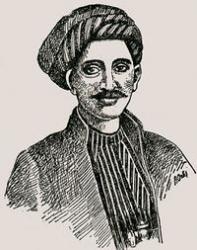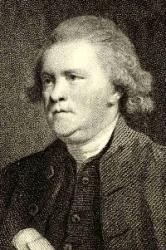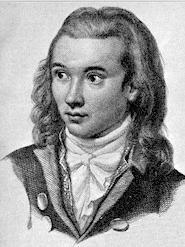Planning worship?
Check out our sister site, ZeteoSearch.org,
for 20+ additional resources related to your search.
- |
User Links
Person Results
Ralph Wardlaw

1779 - 1853 Person Name: Wardlaw Author of "Lift up to God the voice of praise" in Worship in the School Room Wardlaw, Ralph, D.D. This venerable and (in his generation) influential Scottish divine contributed twelve hymns to the praise of the Church Universal that are likely to live in a humble and useful way. As having so done, and besides edited several collections of hymns, he claims a place of honour in this work. Critically, and regarded as literature, his hymns have little of poetry in them; no "winged words" to lift the soul heavenward. They reflect simply and plainly the lights and shadows of everyday experiences of the spiritual life, rather than its etherialities and subtleties. His "Lift up to God the voice of praise " is the most widely known; and there is a certain inspiriting clangour about it when well sung; yet it is commonplace. His "Hail morning, known among the blest," is narrative and prosaic, though it filled a gap at the time in Sabbath morning worship. “At the time by God appointed," "Remember Thee! remember Christ!" and "Contemplate, saints, the source divine," have vanishing gleams of imaginative light and fine and tender emotion. "O how good the hallowed union," "Where the sounds of plaintive wailing," and "See the Sun of truth arise," are melodious and singable, and pleasant but shallow. “Christ of all my hopes the ground," (Pt. ii.) "When with wasting sickness worn," is much too long, but is a fairly good song of Zion. Wardlaw published in 1803 a Selection of Hymns, to displace what was called The Tabernacle Collection, 1800, that had been used by the Congregationalists of Scotland, and to which he contributed a few hymns. He was assisted in the preparation of this compilation by Dr. Charles Stuart, of Dunearn. The first edition contained 322 hymns. In 1817 a Supplement was added of 171, bringing up the number to 493. Of these eleven (or twelve strictly) were by Wardlaw. Two of these had previously appeared in the Scottish Missionary Magazine (vol. viii. 48). His hymns bear so very slight a proportion to Dr. Wardlaw's writings as a profound theologian and expositor and thoroughly-equipped controversialist on the chief problems of the period, as to make it necessary to refer the reader to his remarkable Life, by the Rev. Dr. W. L. Alexander, entitled, Memoirs of the Life and Writings of Ralph Wardlaw, D.D. (2nd ed., 1856).
Wardlaw was born at Dalkeith on December 22, 1779, where he received his early education, later attending Glasgow University. His only church was in Glasgow. He died at Easterhouse near Glasgow on Dec. 17, 1853, and his public funeral is still remembered for the representative character of the vast multitude who attended it. [Rev. A. B. Grosart, D.D., LL.D.]
Of Dr. Wardlaw's hymns the following are still in common use:—
1. Glad when they saw the Lord. Easter.
2. Hail, morning known amongst the blest [saints]. Sunday Morning.
3. Lift up to God the voice of praise. Praise to the Father.
4. 0 Lord our God, arise. Missions.
5. Remember Thee, remember Christ. Holy Communion.
6. See the Sun of Truth arise. Christ the Light.
Of these Nos. 3-5 appeared in the Tabernacle Collection, 1800.
-- John Julian, Dictionary of Hymnology (1907)
=============
Wardlaw, R., p. 1232, ii. Of his hymns, Nos. 1, 2 are in his Selection, 1803, and No. 6 was added in the Supplement of 1817. This Supplement also contains "O how good the hallowed union," and "Whence the sounds of plaintive wailing," p. 1232, ii.
--John Julian, Dictionary of Hymnology, New Supplement (1907)
Ralph Wardlaw
Nāşīf Yāzijī

1800 - 1871 Person Name: ناصيف اليازجي Author of "لاسم يسوع هللوا" in كتاب الترانيم الروحية للكنائس الإنجيلية Nasif al-Yaziji (March 25, 1800 – February 8, 1871) was a Lebanese author at the times of the Ottoman Empire and father of Ibrahim al-Yaziji. He was one of the leading figures in the Nahda movement. We was a poet, wrote and translated many hymns, and helped in translating the complete Bible into Arabic.
ناصيف بن عبد الله بن جنبلاط بن سعد اليازجي (25 مارس 1800 - 8 فبراير 1871)، أديب وشاعر لبناني ولد في قرية كفر شيما، من قرى الساحل اللبناني في 25 آذار سنة 1800 م في أسرة اليازجي التي نبغ كثير من أفرادها في الفكر والأدب، وأصله من حمص.
لعب دورا كبيرا في إعادة استخدام اللغة الفصحى بين العرب في القرن التاسع عشر، عمل لدى الأسرة الشهابية كاتبا وشارك في أول ترجمة الإنجيل والعهد القديم إلى العربية في العصر الحديث.
Nāşīf Yāzijī
John Ripon
Author of "All hail the power of Jesus' name" in The Harvard University Hymn Book
John Ripon
Shelly Hamilton
b. 1954 Arranger (Last stanza setting) of "CORONATION" in Rejoice Hymns
Shelly Hamilton
William Mason

1725 - 1797 Person Name: Wm. Mason Author of "Glory to God Alone" in Song-Hymnal of Praise and Joy Mason, William, M.A., was born at Kingston-upon-Hull, 1725, and educated at St. John's College, Cambridge. He was some time a Fellow of Pembroke Hall. On taking Holy Orders he became Rector of Aston, and Precentor of York Minster. He died April 5, 1797. His poetical writings, including Poems, Tragedies, Odes, and Hymns, published at intervals, were collected and issued in 4 vols. in 1811 as The Works of William Mason, M.A., Precentor of York, and Rector of Aston. His hymns, few in number, include, "Again the day returns of holy rest”; "Soon shall the evening star with silver [silent] ray", &c. These are in vol. i. of his Works.
-- John Julian, Dictionary of Hymnology (1907)
=======================
Born: February 12, 1725, Kingston-upon-Hull, England.
Died: April 7, 1797, Aston, England. There is a plaque to his memory in Poet’s Corner, Westminster Abbey (next to Milton), with a bas relief image of him.
Pseudonym: Malcolm MacGregor.
Mason was educated at St. John’s College, Cambridge, and became fellow of Pembroke College in 1749. After taking Holy Orders, he became Rector of Aston (near Rotherham), Yorkshire, in 1754. He was appointed Prebend of Holme in York Minster in 1756, Canon Residentiary in 1762, became Precentor and Prebendary of Driffield in 1763. He also served as literary executor for poet Thomas Gray. His works include:
Musaeus, 1744 (a lament for Alexander Pope, in the style of Lycidas)
Isis, 1748
Elfrida, 1752
Odes, 1756
Caractacus, 1759
The English Garden, 1772, 1777, 1779 and 1782
An Heroic Epistle to Sir William Chambers, 1774
Ode to Mr. Pinchbeck, 1776
Epistle to Dr. Shebbeare, 1777
Essay, Historical and Critical, of Church Music, 1795
Sappho, 1797
Sources:
Julian, p. 717
Robinson, p. 35
http://www.hymntime.com/tch/bio/m/a/s/mason_w2.htm
========================
http://en.wikipedia.org/wiki/William_Mason_%28poet%29
William Mason
Michael E. Young
b. 1939 Composer (desc.) of "CORONATION" in The Presbyterian Hymnal b. 6-25-39, San Francisco; composer, organist
LOC Name Authority File
Michael E. Young
Johann Adolf Schlegel
1721 - 1793 Person Name: Joh. Adam Schlegel Author of "Schau, großer Herr der Herrlichkeit" in Deutsches Lieder- und Melodienbuch Schlegel, Johann Adolf, D.D., son of Dr. Johann Friedrich Schlegel, Appellationsrath at Meissen, in Saxony, was born at Meissen, Sept. 17, 1721. After passing through the famous school at Pforta (Schulpforta), near Naumburg, he studied, from 1741 to 1746, at the University of Leipzig, where he became acquainted with Cramer, Gellert, and Klopstgock, and was one of the principal contributors to the Bremer Beiträge (Neue Beyträge zum Vergnügen des Verstandes und Witzes). In 1746 he became a private tutor at Strehla, in Saxony, and then returned to Leipzig, where he occupied himself in literary work, until he went, in 1748, to live with his friend Cramer at Crellwitz, near Lützen. He remained at Crellwitz till 1751, when he was appointed a master in his old school at Pforta, and also diaconus of the church there. In 1754 he became chief pastor of the Holy Trinity church at Zerbst, and also professor of Theology and Metaphysics in the Academic Gymnasium in that town. He removed to Hannover in 1759, as pastor of the Markt Kirche. In 1775 he was removed to the Neustadt Church there, as chief pastor, and also as Consistorialrath and Superintendent. "While retaining his pastorate at Hannover, he was also appointed, in 1782, as General Superintendent of the district of Hoya. In 1787 he exchanged this for the General Superintendentship of the Principality of Kalenberg. The same year he received the degree of D.D. at the Jubilee Festival of the University of Göttingen. He died of fever, at Hannover, Sept. 16, 1793…
Schlegel was a most prolific writer, though to the literary world at large the names of his song, August Wilhelm and Friedrich von Schlegel, are better known. He was one of the most celebrated preachers of his time, and the author of many volumes of sermons. His hymns suited the taste of the Rationalistic period, and were exceedingly popular in the end of the 18th century, but have now, in great measure, passed out of use. Many of them were merely polished and weakened versions of, or were founded upon, earlier hymns. In his strictly original hymns, he does not at all equal either Gellert or Klopstock.
His hymns appeared in the following collections:—
(1) Sammlung geistlicher Gesänge zur Beförderung Jer Erbauung, Leipzig, 1766; 2nd ed., revised and enlarged, Leipzig, 1772. (2) Zweite Sammlung. Leipzig, 1769. (3) Dritte Sammlung, Leipzig, 1772. (4) Yermischte Gedichte, 2 vols., Hannover, 1787 and 1789 [1, 2, 4, in British Museum; 3 and 2nd ed. of 1 in Hamburg Library.] He edited, and contributed to, the 1792 Appendix to the Hannover Gesang-Buch, 1740.
One of Schlegel's hymns is a translation of, and is noted under "Veni Creator Spiritus." The others which have passed into English are :—
i. Wie herrlich strahlt der Morgenstern. Love to Christ. First published in 1763, as above, p. 112, in 7 st. of 11 1., and entitled, "Longing after union with Jesus, on the model of the old hymn, Wie schon leuchtet der Morgenstern." The trs. in common use are :—
1. How brightly beams the Morning Star! This is a good translation, omitting st. iv., vii., by Miss Winkworth, in her Chorale Book for England, 1863, No. 36.
2. How brightly shines the Morning Star! What eye descries it from afar. A good tr., omitting st. vii., contributed by J. M. Sloan to J. H. Wilson's Service of Praise, 1865, No. 282, and repeated, omitting st. iii., iv., in Wilson's Songs of Zion, 1878.
Hymns not in English common use:—
ii. Es lag die ganze Welt. St. John Baptist's Day. The tr. from Schlegel's recast is "The world enslav'd to sin."
iii. Jauchzt! es ist eine Ruh vorhanden, Sleeping in Jesus. First published in his Vezmischte Gedich, vol. i., 178 , p. 128, in 2 stanzas of 10 lines, dated 1777, and entitled, "Of the happiness of Heaven." Translated as "Rejoice, that rest is not far distant." By Miss Manington, 1863, p. 89.
iv. Mein Jesu, fur dein Herz. Passiontide. First published in 1766, as above, p. 65, in 14 st. of 6 1. Tr. "How trying to the heart." By Dr. H. Mills, 1845, p. 210.
v. Schweigt Stürme! brauset nicht ihr Meere. Summer. This is an Ode, first published in the Neue Beyträge, &c, Bremen and Leipzig, vol. i., 1744, and entitled, " Praise of the Godhead. On the model of the 104th Psalm." It is translated as, "Around me all is joy-—and oh, my God." By Miss Fry, 1859, p. 111.
vi. Tag, der Erleuchtung uns gebracht. Whitsuntide. First published in 1769, as above, p. 42, in 9 st. In some collections, as in the Kopenhagen Gesang-Buch, 1782, No. 282, it begins "O Tag, der uns des Vaters Rath." This is translated as "O day! that hast unto our souls set forth." By Miss Fry, 1859, p. 94. [Rev. James Mearns, M.A.]
--Excerpts from John Julian, Dictionary of Hymnology (1907)
Johann Adolf Schlegel
T. Martin Towne
1835 - 1912 Arranger of "[All hail the power of Jesus' name]" in Sabbath Songs Towne, T. Martin. (Coleraine, Franklin County, Massachusetts, May 31 [sic], 1835-- ). Methodist. Attended Williston's Seminary, East Hampton, Mass. 1855 to Hudson, New York, then Albany. Taught in Ypsilanti, Michigan, then Detroit. Settled in Janesville, Wisconsin. Served in the Civil War. Settled in Chicago; married Belle Kellogg.
Keith C. Clark, DNAH Archives
T. Martin Towne
W. Lawrence Curry
1906 - 1966 Person Name: Lawrence Curry, 1906 - Descant by of "CORONATION" in Hymns of the Saints
W. Lawrence Curry


 My Starred Hymns
My Starred Hymns



